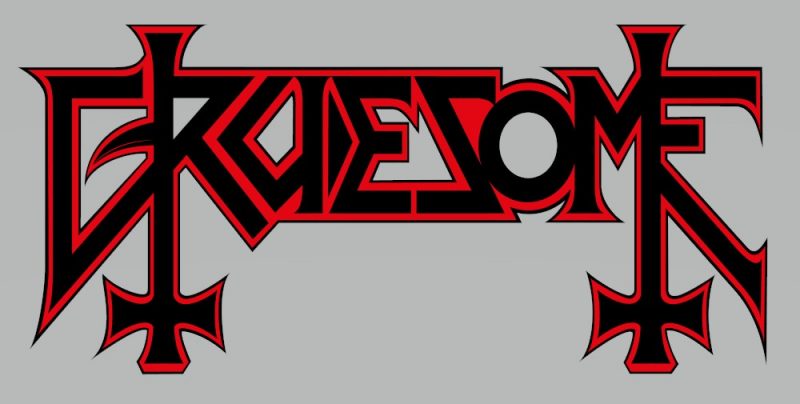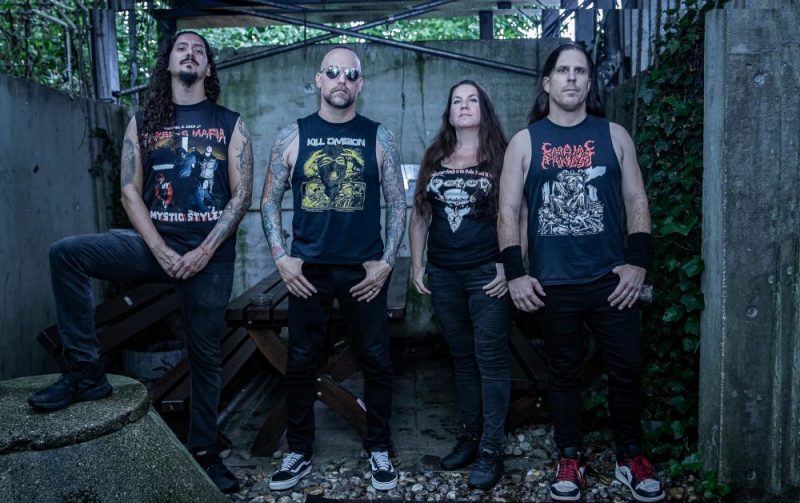Earlier this month, Gruesome finally released their long-awaited third album. And just when we thought we had a decent grasp of the band’s sound after their earlier tributes to Death, we got a bit of a surprise. Chuck Schuldiner’s band is still revered a lot, but Silent Echoes sounds more free and, because of that, perhaps even more inspired. More than enough reason to catch up with vocalist-guitarist Matt Harvey, who many of us also know from the excellent Exhumed. Let’s go!

First of all, congratulations on the new album. It sounds great, especially since you have moved the band a bit further from the original Death-songs. It seems this is not just by mere accident, since in the bio youy explicitly point out that there is less “winking at the audience on this one”. What was the thought process behind this?
For my part in putting the record together, I just hadn’t learned the songs from Human when I was a kid like I had for the first three Death records. I spent a lot of nights in my bedroom in 1989-1990 obsessively rewinding my Scream Bloody Gore, Leprosy and Spiritual Healing cassettes and working through those riffs by ear. And the stuff that you learn in the first few years of becoming a guitar player tends to really stick with you. So those early riffs are so embedded in me just as a death metal guitarist, it was effortless to reference them. By the time Human came out, I was already writing my own songs in Exhumed and was focused on stuff that was more extreme and underground, so I never sat with that record the way that I did with the first three as a kid. And that turned out to be kind of a plus as coming to the record from an analysis perspective in your forties is a lot different than what I would’ve done as a teenager. This time Dan and I really worked through the riffs together, with Dan (guitar – MH) tweaking my stuff to be a little more involved than I might normally write, so there was a real collaborative spirit going on in the writing process, more so than ever before.
 Still the album has been written and recorded in the spirit of Death’s technical masterpiece Human. What does “in the spirit of” mean here?
Still the album has been written and recorded in the spirit of Death’s technical masterpiece Human. What does “in the spirit of” mean here?
I look at our records as companion pieces to the source material. Listening to Silent Echoes should feel like a continuation of Human, or like listening to additional tracks the band might have written for the record. We want to not only celebrate the source material and our love of it, but reconnect the audience with their own love of it, and we can sort of compare and musically discuss what we’ve taken from Human as fans and musicians. So there’s a joyful celebration side of the record that celebrates the legacy of Death, but also a music-nerd, almost academic approach: we’ve exhaustively studied the source material and then used the same approaches, influences and musical ideas to then create our own thing. Gruesome is kind of a strange band in that sense, as it’s not just about raw, unbridled creativity and energy. There’s a very specific framework to what we do and it’s a fun and interesting way to work as a guitarist and songwriter.
How did you set about to write and record “in the spirit of” Human?
I think Dan, Gus (drums – MH) and I, who are the writing/recording nucleus of the band, each had our own approaches. I tried to keep some guiding principles in mind: the songs on Human are shorter and more direct in some ways than what Death was doing on Spiritual Healing, even though they have more dynamics. I also tried to think in specific intervals. This is the era where Chuck was using more add9 chords and more riffs with tritones, as opposed to his previous fascination with harmonic minor scales and Phrygian-mode stuff. The lyrics had to become more inward-facing, the logo had to be altered, the cover art had to move away from the glorious Ed Repka monster stuff, and we knew we needed an instrumental. I know Dan was listening to Focus (the unparalleled Cynic debut – MH), Control and Resistance and Human on repeat, trying to make sure that we were coming from the same place that the guys were when they were doing Human.
As I said this seems to give you a bit more freedom (and maybe less of a format to stick to). Is this true? If so, how did you use that freedom and how was this for you?
I had a lot of fun writing for this record once we entered the final writing process. Half of the album came together in fits and starts over the last several years, which sucks and is a workflow that I hate. But the other half we did in about four months and that was super fun and productive. I would put together a song, send it to Dan, and he would pull it apart and put it back together with more bells and whistles and then the three of us would edit from there. And finally once we were pretty close to finishing, I flew out to Florida and Gus, Dan and I jammed together to cement things and write the instrumental, which was really invigorating: just being in the same space and playing the songs like an actual band. That sounds really simple and obvious, but when I’m 3,000 miles away from the rest of the band, it’s not something we can do particularly often, so it was a great experience to feel that momentum gathering and really feel like we were starting to have a record that was going to be pretty good.
After the first round of writing sessions had fizzled out, I think at that point we had Fragments of Psyche, and early versions of Frailty and Shards, we had tapped Sean to help produce the record. The idea was that he was going to listen to the material as we wrote and give suggestions and then sit with us in the studio and produce the takes, critique the performances, etcetera. So when he died, not only was it fucking tragic but it caused us to rethink the entire process of writing the album. I think after his death, we didn’t really make any progress on the record for at least a year.
The promo sheet also tells us the influence and presence of Sean is everywhere on Silent Echoes. Could you tell me where, for you, this is the most obvious?
Certainly Gus’s drum performance is heavily inspired by Sean, the lyrics for Frailty, while originally written as a reaction to Chuck’s death (as well as the very untimely passing of my brother-in-law a few years earlier) really ended up being about Sean’s death. I know it was very personal for Gus to do Fragments of Psyche for the record, because Sean wrote those drum parts originally. In Voice Within the Void there’s a section with some distorted, echo-y voices that is actually an audio clip of Chuck and Sean talking in the studio during the recording of Human, so he’s literally on the record. Having Paul (Masvidal, Cynic – MH) do a guest solo was also an important nod to Cynic and by extension Sean.
I don’t want to speak for Gus too much, but I think that Sean was a jazz / fusion guy, whereas Gus is really a rock drummer, whose more fusion-y influences come from Sean, not directly from studying Mahavishnu Orchestra or Chick Correa or what have you. And Sean’s playing is so unique that you can make gestures toward it, but it’s hard to really encapsulate it in your own performance.
What were some of the other factors for the seven year gap? Did you use (or need) the time to re-think the direction of Gruesome?
There was a lot of stuff going on for us all musically outside of Gruesome the whole time. Robin did a Castrator record, Dan did a Possessed record, I did two full-lengths, two split 10″ records, a live album and a 7″ EP with Exhumed, Gus and I got involved first doing Spiritual Healing live with James Murphy and Terry Butler in Florida, which lead to us doing Left To Die with Terry and Rick Rozz, playing Leprosy and Scream Bloody Gore stuff live all over the world, there was a global pandemic, and of course all the usual life/work/family stuff that is always happening. However, we all understood where the next Gruesome record was going to go, but things kept happening that put that journey on the backburner.
Lyrically, you seem to work/play with philosophical themes connected with truth, reality, illusions and echoes. Was there a reason the lyrics tilted this way or did this just come about?
I knew I’d be following Chuck’s lyrical progression inward that really started with Human. I tried to look at the themes Chuck was exploring and to then put my own take on them in the 21st century. Obviously the ubiquity of the internet/AI/the surveillance state/ mis-/disinformation/social media, all of which are quite different than where life was in 1991 when Human was written, are gonna change where these themes will take you. I think the main things Chuck was looking for in his lyrics, as well as his art and life, were authenticity, both from others and himself and a sense of control of his own destiny and art. Those are pretty universal, timeless themes, so I started from there and worked my way to where we ended up.
Will you be touring the album? I for one would love to hear some of these songs in a live setting.
We have a bunch of stuff in the works and we should be announcing things very soon. I’m excited to do these songs live and bring our celebration of all things Death-ly to a stage near you as soon as fucking posisble.
Thanks for taking the time to answer these questions (and for a great album).
Thanks for the kind words! Chuck lives!!
Links:










